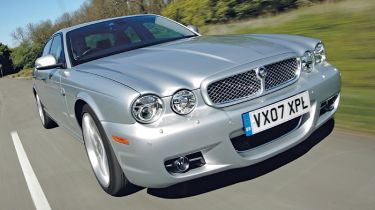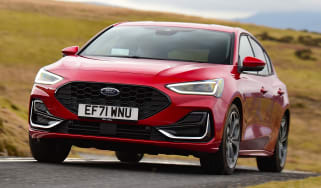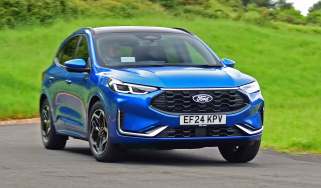Jaguar XJ
Revisions to the latest Jaguar XJ flagship are mainly cosmetic. If you were unconvinced by the original, the revised car won't change your opinion

Revisions to the latest Jaguar flagship are mainly cosmetic, so its traditional strengths of refinement and comfort are undimmed. However, its tight cabin and shallow boot remain, and the XJ's bold styling is likely to divide opinion. If you were unconvinced by the original, we'd be surprised if the revised car will change your opinion - although its competitive pricing, strong residuals and classy image still hold plenty of appeal.
Even super-stylish luxury models such as the Jaguar XJ need a facelift from time to time. And because the Big Cat has been in showrooms since 2003 - and now has rivals like the Audi A8 and Mercedes S-Class breathing down its neck - the British brand has given its flagship a makeover.
From the instant you lay eyes on the revised XJ, you can tell that it has been under the knife. This isn't one of those difficult-to-spot updates, so although the changes to the metalwork are minimal, the Jaguar design team has still managed to give the big saloon a bold new look.
The most obvious change comes at the front, where the deep bumper is more imposing than before, and features a large central air intake. As a result, the facelifted model's jutting chin is much more pronounced, and this gives the XJ an aggressive look - especially when looming up behind you in the rear view mirror.
Our 2.7-litre diesel car also came equipped with neat circular foglamps, although on the range-topping variant, the supercharged XJR, these are replaced by additional cooling vents for the brakes and engine.
Above the new front bumper sits a traditional Jaguar radiator grille, but it now boasts a body-coloured finish, as well as chrome trim inside the air intakes and mesh behind. Further back, the front wings are interrupted by sporty XK-inspired air vents, complete with Jaguar badging. They take the place of the indicator repeaters, which are now integrated with smart new door mirrors.
Other visual changes include lower side sills and the addition of a tiny rear spoiler on the bootlid - the latter has been designed to counteract the aerodynamic effects of the fresh car's lower front end.
By Jaguar's traditionally elegant standards, we can't help feeling that the overall result of these modifications looks heavy handed. But there is no doubt the latest XJ has a much more intimidating presence.
The cabin has received a much lighter touch, with new front seats the major news. They're now heated as standard, and come with the option of a clever air cooling function for the first time.
Slimmer backrests are supposed to improve rear legroom, but the cabin still feels cramped compared to its rivals. The mid-life makeover hasn't done anything to address the shallow boot, either, although customers who need extra interior space can always opt for the long-wheelbase version.
Out on the road, the brand's CATS adaptive damping system ensures the XJ is a fine long-distance companion; its excellent ride comfort and refinement make for relaxed cruising at the motorway limit. It's less convincing on coarse surfaces, but is still an engaging car to drive thanks to its precise - if over-light - steering and capable chassis. Yet while the 204bhp 2.7-litre V6 diesel engine is smooth, it isn't the most responsive oil-burner on the executive market, and is outgunned by its German rivals.
The big saloon's advanced lightweight aluminium bodywork helps to minimise the performance gap, but the XJ takes 8.2 seconds to complete the 0-62mph sprint, and doesn't feel genuinely swift. It is quiet and frugal, though, and the six-speed automatic box is well suited to gentle touring.
Yet while some of the competition provides superior comfort, space and performance, the Jaguar's trump card is value. The entry-level 3.0 V6 Executive petrol variant starts from £43,540, and the diesel line-up kicks off at £45,520. You will have to go for the flagship 4.2-litre XJR to break the £60,000 barrier, so whatever you think of the styling, the Jaguar is com-petitively priced for the sector.
Not all facelifts are a success, and while the jury is still out on the XJ's new look, you'll definitely recognise the latest model when you see one out on the road - and that's exactly what the doctor ordered.







